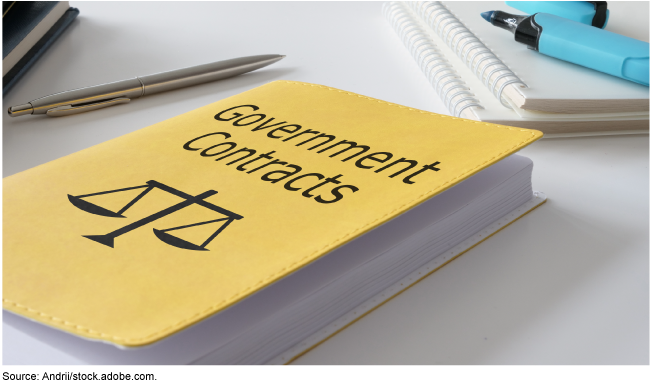Small Business Contracting: SBA Could Improve Oversight of Individual Waiver Requests to the Nonmanufacturer Rule
Fast Facts
The federal government aims to award 23% of its contracts to small businesses, including manufacturers. If no small manufacturer exists for a product, agencies can request a waiver from the Small Business Administration to allow any sized manufacturer to supply the product instead.
Recent SBA data indicated that agencies submitted about 670 waiver requests, roughly 80% of which SBA approved. But its waiver data is incomplete, making it hard to tell what effect the waivers have on small business contracting.
Also, SBA hasn't established policies for how management should review these decisions. We recommended that SBA address these issues.

Highlights
What GAO Found
The nonmanufacturer rule allows federal agencies to award contracts to small business contractors to supply products manufactured by another small business if the contractors do not manufacture those products themselves. If no small business manufacturers exist, federal agencies can request from the Small Business Administration (SBA) a nonmanufacturer rule waiver to allow a small business to supply the product of any sized manufacturer (see figure).
SBA data indicated that from fiscal years 2017 through 2022, agencies submitted approximately 670 waiver requests, roughly 80 percent of which were approved. Given the relatively small number of NMR waiver requests SBA has approved in recent years, stakeholders believed the effect of waivers to be limited. GAO could not determine the effect of these waivers as data in SBA's electronic waiver log on the number of approved requests were inaccurate or incomplete. Some log entries did not match underlying documentation and some status fields did not accurately indicate waiver request denial or approval. SBA officials told GAO they do not conduct scheduled quality reviews of the electronic waiver log. By developing policies and procedures for ensuring the reliability of its waiver request data on a scheduled basis, SBA would have more reasonable assurance that it has reliable data for reporting on and assessing the operation of its NMR program.
SBA's Process for Reviewing Requests for Waivers of the Nonmanufacturer Rule

Additionally, SBA does not have policies or procedures describing how management is to review its analyst's decisions. SBA's guidance requires SBA to review certain types of information in waiver requests, but over half of the 12 approved waiver requests GAO analyzed did not contain evidence showing that analysts reviewed each required component. SBA stated that the analysts may have reviewed the components but not saved documents into the waiver request files. However, SBA was unable to provide support for this claim. By developing policies and procedures to inform management review, including which documents management should review to verify analysts' justification of waiver request decisions, SBA would have greater assurance that these decisions are sound and consistent.
Why GAO Did This Study
Congress has established set-aside programs that require federal agencies to offer contracting opportunities to small businesses. Some policymakers have raised questions about whether nonmanufacturer rule waivers are reducing federal contracting opportunities for small manufacturers.
GAO was asked to examine SBA's recent reviews of nonmanufacturer rule waiver requests. There are individual and class waivers, and this report focuses on individual waivers. This report examines (1) the number of individual waiver requests and their likely effect on small businesses and (2) SBA's policies and procedures for reviewing individual waiver requests. GAO reviewed the data reliability of a nongeneralizable sample of 67 waiver requests in SBA's electronic waiver log for fiscal years 2017–2022 (chosen to include a range of decision statuses for requests from selected agencies) and analyzed SBA's review process documented in the associated files for a subset of these requests. GAO interviewed officials at SBA and the Departments of Defense, Veterans Affairs, and the Interior (selected to account for the volume of waiver requests and a variety of outcomes). GAO also interviewed representatives from three industry associations with expertise in federal contracting.
Recommendations
GAO recommends that SBA develop policies and procedures to (1) review the accuracy of entries in its nonmanufacturer rule electronic waiver log and (2) inform how management should review proposed waiver decisions. SBA concurred with both recommendations.
Recommendations for Executive Action
| Agency Affected | Recommendation | Status |
|---|---|---|
| Small Business Administration | The SBA Administrator should ensure that the Associate Administrator for the Office of Government Contracting & Business Development develops policies and procedures to regularly review the accuracy of entries in its electronic waiver log, including the final status of each NMR waiver request. (Recommendation 1) |
SBA agreed with the recommendation. SBA updated its standard operating procedure for its NMR waiver program as of January 2025. In March 2025, SBA officials told us that the agency continues to develop separate guidelines it will use to ensure the accuracy and completeness of the entries in the NMR log, including the final status of the NMR waiver requests. We will continue to monitor SBA's progress with the actions it is taking.
|
| Small Business Administration | The SBA Administrator should ensure that the Associate Administrator for the Office of Government Contracting & Business Development develops policies and procedures for management review of NMR waiver request decisions. (Recommendation 2) |
SBA agreed with the recommendation. SBA updated its standard operating procedure for its NMR waiver program as of January 2025. In March 2025, SBA officials told us that the agency continues to develop separate guidelines that specify the roles and responsibilities for management oversight of its NMR waiver request decisions. We will continue to monitor SBA's progress with the actions it is taking.
|
